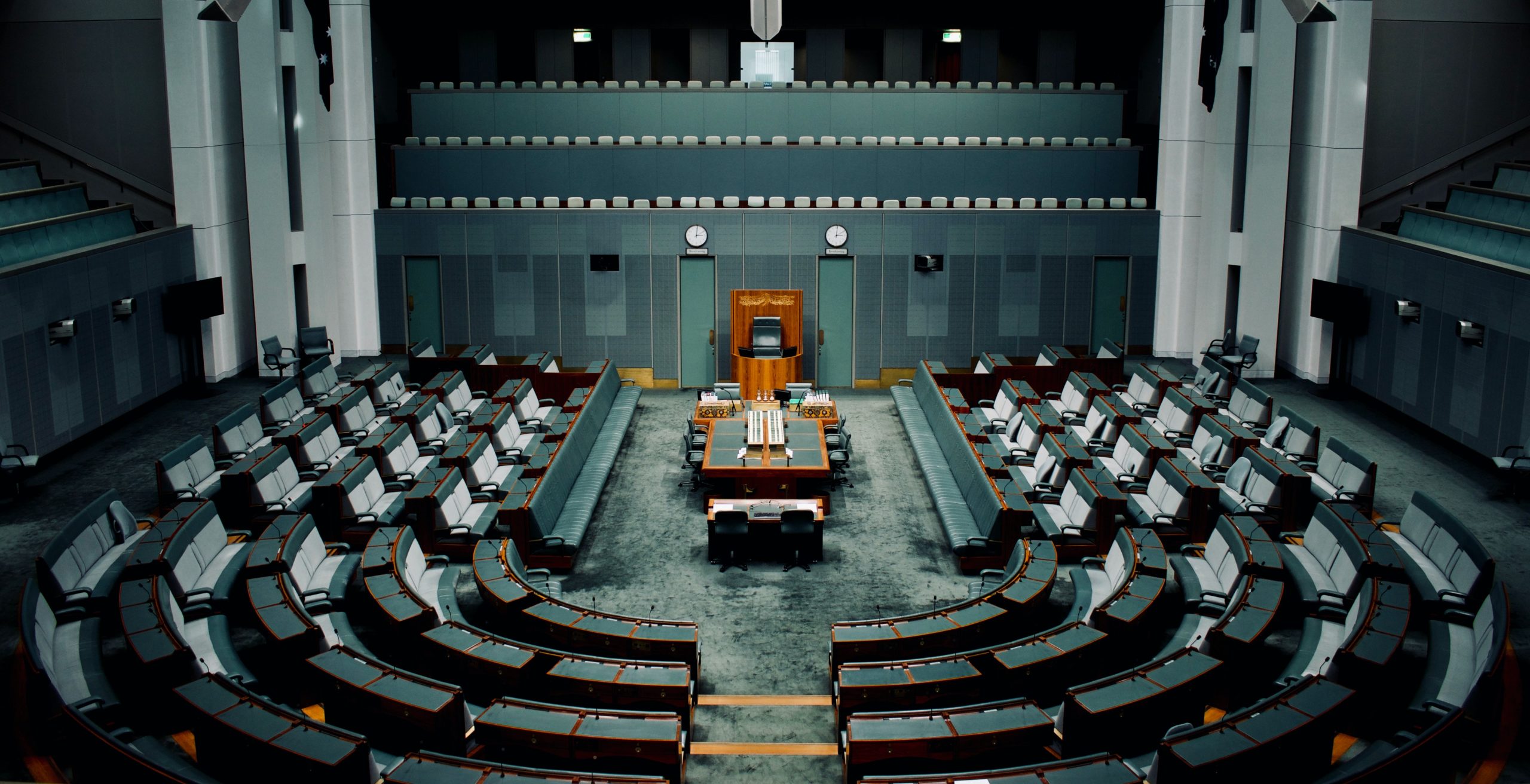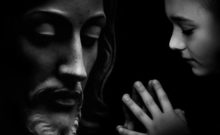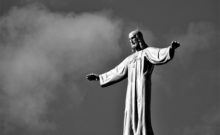It is an unwritten rule of decorum that one does not talk about politics and religion in polite company. But since these things permeate every aspect of our lives, should they not be openly discussed in a passionate but rational and constructive way? The virtual Theology on Tap Central held on Monday May 25, entitled The Joy of Catholic Civic Witness, gave us an opportunity to do just that. The three panelists (Matthew Marquardt, Brendan Steven and Lenita Lopes) shared many insights that help us think more deeply about the connections between religion and civic engagement in all forms. In this brief reflection, I will explore three key themes that arose out of the discussion: justice as the core of all civic engagement, the interconnectedness of religion and politics, and living a life of Catholic witness in an imperfect world. This reflection will attempt to capture the spirit of the evening, which was to go beyond the hot-button issues that usually come to mind when religion and politics are mentioned in the same breath and find common ground that Catholics of all backgrounds can share.
Civic engagement and justice
At first blush, the words “civic engagement” can call to mind involvement in the formal political structures of our society. But our panelists provided a helpful and expansive way to think about this term: civic engagement encompasses all those ways in which we deploy the talents God has given us to serve the people in the communities we live in. While it does include electoral activity, it also includes anything we can do to contribute to the well-being of those around us, such as volunteering, holding a birthday fundraiser on Facebook for a favourite charity, and even something as creative and generous as making sandwiches on an afternoon to feed a group of people doing ministry. No matter the form, at the heart of all civic engagement is a passion for justice that motivates us to take action to make the world around us a better place. As defined by the Catechism of the Catholic Church, justice is a person’s “will to give their due to God and neighbour”, the virtue disposing one to “establish in human relationships the harmony that promotes equity with regard to persons and the common good” (CCC 1807).
Something that illustrates this nicely is an anecdote Matthew, a lawyer and founder of the non-partisan civic organization Catholic Conscience, shared about a man named Frank. Frank was a quadriplegic from birth resident at a hospital after the passing of his parents. Being born a quadriplegic, he had never been able to independently change his clothes, comb his hair or brush his teeth – the mundane things able-bodied people take for granted. But every day he would sit in his wheelchair by the front door of the hospital and say hello with a smile to everyone who came in. Over time many people came to know by him by name and have conversations with him. Despite his limitations, Frank made “tremendous use of small gifts”. He responded to his desire to be a good neighbour and did what he could to build harmony and community at the front door of the hospital.
Frank’s story also reminds us that the virtue of justice is habituated in us through regular practice. God, who is justice and goodness itself, helps us in developing this virtue by placing in us desires to do good things for others, enticing our free will towards opportunities to practice justice. As Brendan, the Executive Director of Catholic Conscience, stated, this gives us “the confidence of knowing you are willed into existence by (a higher being) that wants you to do things … you get to be a tool of God, living out his designs for creation and how He will make life for humanity better.” Therefore, when they are connected to God, acts of civic engagement find their deepest meaning and joy because they are elevated from mere human courtesy to a participation in the divine mission to renew the world.
The relationship between religion and politics
Although our panelists emphasized that civic engagement is more than politics, they also made clear how interwoven politics is with everyday life. Lenita, the Stewardship & Program Coordinator at the Newman Centre in Toronto, mentioned a family member, self-described as a “non-political” person, making the political act of complaining to his local city councillor about the lateness of municipal garbage collection. Therefore, if politics affects a banal thing like waste disposal, should it not also engage with the highest thing, namely our relationship with God? As our panelists noted, religion provides a moral framework to making decisions both personally and socially.
The modern secular world often sees religion’s involvement in the public sphere as a danger to the state and insists it be kept private. However, the Biblical view is that the state finds its true, highest purpose in a vocation given to it by God. To get at the right relationship between religion and politics, it is helpful to start with Jesus’ response when He was asked if it was lawful for the Jews in Judea to pay taxes to their Roman occupiers:
“They brought him a coin. And Jesus said to them, “Whose likeness and inscription is this? They said, “Caesar’s”. Then he said to them, “render therefore to Caesar the things that are Caesar’s, and to God the things that are God’s.” (Matthew 22:20-21)
In his reply, Jesus makes a subtle but noteworthy move: He implies that there is a difference between what is owed to the government and what is owed to God. This effectively rejects the Roman understanding of Caesar as divine (one of the emperor’s titles was Divi Filius, or Son of God). Therefore, we do not worship the state. Rather, as St. Paul writes, “there is no authority except from God, and those that exist have been instituted by God. … (the ruler) is God’s servant for your good.” (Romans 13: 1, 4). This means that the state does not exist for the sake of its own power but is called to exercise its authority in service of the common good and use just methods to attain it. Consequently, St. Paul’s instruction that every person be subject to the governing authorities is properly understood as a mandate for citizens to cooperate in work of building the common good in society, which ultimately is an act of obedience to God.
Indeed, our political system recognizes the existence of a proper ordering of state authority and individual rights vis-à-vis our principal allegiance to God. As Matthew pointed out, the ideas of liberal democracy and human rights that emerge out of the West are built on a “solid bedrock” of Christianity. For example, the preamble to the Canadian Charter of Rights and Freedoms reads simply: “Whereas Canada is founded upon principles that recognize the supremacy of God and the rule of law.” In recognizing God’s primacy, we are reminded that the notions of human rights and equality under the law are grounded in the reality that all human beings are equally creatures of God made in His image. Therefore, all are equally deserving of the dignity inherent in such a status. At its best, religion elevates politics by reminding those involved in the work of the common good (everybody) to organize all the aspects of our political and social life around the centre that is God’s call of justice.
Living a Catholic civic life in a compromised world.
This brings us to the last of the major themes, which acknowledges that the witness of our faith must take place within a broken world filled with sinners, including ourselves. It is important to remember who we are by virtue of our Baptism: the mystical body of Christ. As Brendan emphatically declared, this empowers us to “live with the satisfaction of knowing we won; Christ came, Christ saved the world, game over!” Confident in this truth, all we must do is follow His example. The life of a Christian can be summed up as the dynamic of “come” and “go”: come learn from, healed by and fed by Christ, and then go out to the world and to bring others to Him.
We come to Christ through prayer. Prayer can take many forms, from formal liturgy to moments of quiet solitude, but at its core, to pray means “to ask”. Like a military commander who seeks the high ground in order to oversee the entirety of a battle, Jesus, having ascended into Heaven, is now able to survey the whole field of operations of His Church. Therefore, we, who are the foot soldiers and officers on the battlefield, can approach our commander to equip us with the tools we need to fight the battle well. These tools are the gifts of the Holy Spirit – wisdom, understanding, counsel, fortitude, knowledge, piety and fear of the Lord. As the panelists rightly note, these are graces from God, and we must constantly beg for His help to cultivate them in our lives by way of ongoing personal conversion from our self-centredness.
We must also listen to God speaking to us in our hearts and through others because this is how He tells us where to go. A great illustration of this that the panelists shared is the process of deciding who, from a Catholic perspective, to vote for in an election. The Church teaches it is a moral duty to exercise the right to vote, because by doing so we live up to our co-responsibility for the common good (CCC 2240). However, there is no political party in Canada that perfectly aligns with the Catholic Church’s teachings about the ordering of social life and the attainment of individual and social justice (often referred to as Catholic Social Teaching or CST). From a CST perspective, every political party comes close in some areas and misses the mark in others. The question we then bring to God is: “Father, none of these choices is perfect. But I can’t walk away. Which one do I pick?”
To help us fulfill this duty, we need to be attentive to the passions and desires God has placed in our hearts. We might encounter several political concerns that promote the common good in some way, but there are always certain ideas and causes that attract us more powerfully than others. Prayerfully paying attention to our responses to a political idea helps us discern our priorities, which illuminates the decision God is drawing us to make. Like most decisions in life, we give up one good thing that attracts us to obtain another that attracts us more and that God wants to gift us with. But this also shows us something else that the panelists emphasized: there is more than one way to be a faithful, witnessing Catholic in not just voting but in the entire range of activity that makes up civic engagement in society. There are many varieties of gifts and forms of service, but they all flow from the same Spirit for the common good (1 Corinthians 12:4-7).
Lenita remarked that our faith is not like a hat that we can take off when it is convenient. Properly lived, it is at the core of who we are and animates all our actions. A Christian striving to be a saint that engages the world with love and brings God into the world by their actions is by extension a good citizen of their neighbourhood, city, province and country. Society is not ultimately perfected by laws but by love of neighbour. There is no better and no more joyful path to social justice than to emulate the total, self-giving love that Christ has modeled for us.
About the Author: M.J. began to fully embrace his faith after a life-changing experience at World Youth Day 2011 in Madrid. An original member of the campus evangelization program at York University, he helped the Chaplaincy blog reach 11,000 people in 60 countries within the first six months of its launch. While completing a degree in Political Science from York, M.J. served on the editorial board of a student-run academic journal and as communications director for a campus chapter of a major Canadian political party. He has also been published in a national youth magazine. M.J. is proud to be a volunteer with Faith Connections and help his fellow young adults build a community of faith through enriching in-person and virtual events.





